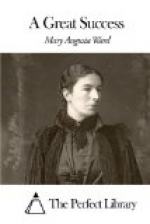* * * * *
The end of July arrived. The Dunstables left town. At a concert, for which she had herself sent them tickets, Lady Dunstable met Doris and her husband, the night before she departed.
“In ten days we shall expect you at Pitlochry,” she said, smiling, to Arthur Meadows, as she swept past them in the corridor. Then, pausing, she held out a perfunctory hand to Doris.
“And we really can’t persuade you to come too?”
The tone was careless and patronising. It brought the sudden red to Doris’s cheek. For one moment she was tempted to say—“Thank you—since you are so kind—after all, why not?”—just that she might see the change in those large, malicious eyes—might catch their owner unawares, for once. But, as usual, nerve failed her. She merely said that her drawing would keep her all August in town; and that London, empty, was the best possible place for work. Lady Dunstable nodded and passed on.
The ten days flew. Meadows, kept to it by Doris, was very busy preparing another lecture for publication in an English review. Doris, meanwhile, got his clothes ready, and affected a uniformly cheerful and indifferent demeanour. On Arthur’s last evening at home, however, he came suddenly into the sitting-room, where Doris was sewing on some final buttons, and after fidgeting about a little, with occasional glances at his wife, he said abruptly:
“I say, Doris, I won’t go if you’re going to take it like this.”
She turned upon him.
“Like what?”
“Oh, don’t pretend!” was the impatient reply. “You know very well that you hate my going to Scotland!”
Doris, all on edge, and smarting under the too Jovian look and frown with which he surveyed her from the hearthrug, declared that, as it was not a case of her going to Scotland, but of his, she was entirely indifferent. If he enjoyed it, he was quite right to go. She was going to enjoy her work in Uncle Charles’s studio.




